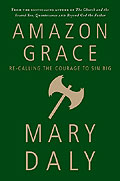To continue with Sara Robinson's brilliant series on authoritarian leaders and followers (see my previous post for all the series links), the rise of evangelicals as a political force has steadily grown over the past 30 years. But there are other reasons:
Good political organizing, coupled with the fulsome noise of the Mighty Wurlitzer, have indeed added former liberal constituencies -- blue-collar workers, Catholics, and so on -- to the Republican column. Many of these former moderates were drawn into the far-right fold by targeted political messaging that played up their fears and activated (to at least some degree) the fear-and-submission response characteristic of right-wing followers, as well as expansion-oriented conservative religious groups that replaced fraying community, family, social, recreational, and personal support networks.Fear, as I have said previously, is a driving force in creating SDO (social dominance oriented) personalities or authoritarians. What are those fears?
- "American middle-class prosperity peaked in 1972" and has been declining.
- "[T]he richest, the dollars (in real terms) are fewer, and they don't go as far as they used to."
- "...decades of misbegotten foreign policy in the Middle East came home to roost, shattering a sense of American invulnerability that had already been severely dented by Vietnam."
- "9/11, of course, put whole new factions of the country into a fear-induced malaise."
- "Republican messaging since the mid-70s has kept all these threats uppermost in the American imagination, creating a climate of fear that supports authoritarian thinking even in people who should know better."
- "Republican hostility to any kind of investment in social capital has left these people a) enraged at the foreclosure of opportunities their parents took for granted and b) left with nowhere to turn but churches."
All these issues, and others, provided ripe openings for the disciplined organizers of the authoritarian right. It's like they've slapped stick-on hot buttons onto all of us -- and now keep pushing them for all they were worth to activate a Pavolvian fear response. ("Abortion! Faggots! Affirmative action! Brown people! Flag-burning!") There has always been -- and probably always will be -- a hard core of natural authoritarian leaders and followers in any society. But their numbers have almost certainly been swelled (my non-supportable guess is that it's been at least doubled) by tens of millions of "soft-core" authoritarians who've been shanghaied onto the authoritarian bandwagon over the past three decades.Changing the minds of authoritarian leaders and their hard-core indoctrinated followers may be a lost cause. But maybe there's hope for those "who got swept up in the right-wing hysteria of the past three decades" and "bringing a good slice of this group back may not be as hard as we've been prone to think." Some SDO followers have left and recovered, and that is where Sara shines in offering some viable tactics to help those pacing at "the wall" as they consider how to escape.
First, some just won't listen, so realistically, "save your breath." But...
there are a few groups of people who are more likely to be open to change. Women, whose worldview tends to be more nurturant and relationship-oriented, may be more open than men to liberal points of view. Even those who've spent their entire lives in authoritarian systems get frustrated at times with their lack of power and privilege, the unfairness of the men who outrank them, and the overt bullying. In addition, women are generally less conforming than men, and more likely to reject one-size-fits-all moral systems in favor of ones they see as more just and fair.
People who are under stress without a support system -- college students, single mothers, travelers, prisoners -- are often open to anyone offering ideas for how they can increase their sense of security and connectedness. While this drives many of them straight into waiting authoritarian arms, it could just as easily become an opportunity for them to learn to trust their own inner authority instead.
Those undergoing major life transitions may be similarly receptive: the newly married, new parents, the recently relocated, career or job-changers, the newly divorced or widowed, people who've just lost a parent, and the recently retired are all in positions where the old answers are up for questioning, and the prospect of the larger world outside the wall may look very welcoming. And, of course, people undergoing major self re-creations -- emerging gays and lesbians, new immigrants, and those in the midst of large-scale socioeconomic change -- are likely to be very open to new way of strengthening their confidence, and learning to navigate their brave new worlds.Sara rightfully points out that "fear is the mind killer" so "in talking to right-wing authoritarians (RWAs) -- in any situation -- the first and greatest challenge is to reduce the level of fear and increase the level of trust." With that said, Robinson offers practical approaches for liberals to undertake in talking to RWAs. I've paraphrased Sara's points and added some of her quotes:
- Despite the urge to disagree or argue, don't. Find common ground. Keep the conversation on things in which you can agree. Some conservatives may dislike Bush's "spending, foreign policy blunders, and neglect of important domestic infrastructure. (Small businesspeople, in particular, can give you a real earful.)" Avoid conflict to minimize the notion that you are a threat. Affirm, validate as neutrally as you can and keep it safe.
- Don't be a wishy-washy moral relativist. RWAs despise and distrust ambiguity so stick to black-and-white subjects, areas that you feel passionate about where you can express a moral position "in near-absolutes and with a certain amount of zeal. They're impressed by zeal, and are often surprised to find that we have our own share of it. If you can unambiguously and firmly state a principle that you share with the RWA (marriage, family, and community are great topics for this kind of commonality), you'll find them warming to you quickly."
- When RWAs articulate ambiguity in themselves, listen and validate. "You're so right. This world is a pretty complicated place, and the answers aren't always easy, are they?" Create a safe haven, "a comfortable, easy, give-and-take atmosphere in which reasonable people can reason together -- and remain friends even if they don't agree on the ultimate answer."
- Cite legitimate authorities. You can bet that Michael Moore isn't legit in the eyes of a RWA. Stick to sources in which a RWA can agree. Remember you're building trust so "support your points by finding and citing authorities they accept." As Sara recommends, "If you must quote an authority they're likely to regard as dubious, do what you can to establish that sources' bona fides. 'Did you know that Bill Moyers is a Southern Baptist minister?' It won't always work among the harder core -- Moyers isn't in the SBC now, and therefore has forfeited any authority he may have had -- but for the softer core, this at least puts a little grease on the ball. If you can't find a direct source they'll respect, at least try to find a source that's been vetted and given the Seal of Approval by someone they do trust." Don't forget the Bible--the ultimate authority for religious RWAs. If you know Scriptures well, try the verses that haven't been spoon fed to them by their church. Remember to avoid arguing over some of the RWA's favorites about gays, women, etc. The idea is to help the RWA to question the validity of their indoctrination. Be gentle in nurturing open-mindedness.
- Authoritarians don't think in abstracts so keep it literal and be specific. "While they can usually summon empathy for people in their own belief communities -- people who are very much like them -- they have a very hard time imagining themselves in the shoes of people who are different." RWAs can easily "demonize outsiders" and hunker down to protect themselves against perceived threats. So "keep any critiques of ideas and people as personal and literal as possible. You need to draw a clear, bright line connecting the negative personal harm that particular RWA has sustained as the direct result of a policy, and the specific leader who implemented it. As we know all too well, there's no limit to the amount or degree of abuse a determined RWA will forgive; but making people see the concrete damage their leaders are inflicting on them personally may in time re-direct their sense of persecution, and undermine the legitimacy of their accepted authorities." Sara offers a good example:
Any time you can frame a point in terms of, "This person/policy/action has harmed you , this much and in this way," you're more likely (though still far from certain) to get your point across. If you can't say, with proof, that "Bush did this to you, you probably won't get through.
It's important to note that positive attributes can also be presented this way. "We should do this because it's fair to minorities" cuts no ice at all with RWAs. "We should do this because it's in your own self-interest" will get you a lot farther. And don’t neglect to spell out every possible benefit, as clearly and specifically as possible. Don't assume they'll make the logical leaps to see those on their own. These are very concrete thinkers: leaping isn't their strong suit.
Sometimes, keeping communication personal and literal can even short-circuit the guilt-evaporation mechanisms Dean discussed. God may have forgiven you, or you may have just been doing what you were told and following the rules, or the person who harmed you may merit forgiveness -- but the fact remains that your actions (or a third party's) have demonstrably harmed someone who matters to you, or created problems in your own life. Absolution may clear your conscience, but it doesn't clean up the mess. Associate personal actions with their direct results, and you may stand a chance of making them realize the full brunt of their behavior.
"When I began to illustrate my thesis by drawing on the examples of Hitler and Stalin, when I tried to expose the social consequences of child abuse, I encountered fierce resistance. Repeatedly I was told, "I, too, was a battered child, but that didn't make me a criminal." When I asked for details about their childhood, I was always told of a person who loved them, but was unable to protect them. Yet through his or her presence, this person gave them a notion of trust, and of love.
"I call these persons helping witnesses. Dostoyevsky, for instance, had a brutal father, but a loving mother. She wasn't strong enough to protect him from his father, but she gave him a powerful conception of love, without which his novels would have been unimaginable. Many have also been lucky enough to find enlightened and courageous witnesses, people who helped them to recognize the injustices they suffered, to give vent to their feelings of rage, pain and indignation at what happened to them. These persons never became criminals."Enlightened witnesses can affirm, validate, and act as a champion for a RWA by modeling healthy and respectful behavior. RWAs are human beings with feelings and legit needs and giving them permission to acknowledge their wants and needs makes you a support person for them. Because RWAs "are sadly accustomed to subordinating their own needs to those of their superiors; in fact, one of the struggles we often see in recovering fundies is a complete inability to even acknowledge that they have needs of their own, let alone identify them, let alone act to meet them. They simply don't know where to begin. Also, because their own authorities use guilt and shame to control them, they've seldom been allowed to see themselves as truly good and moral people."
The work of an enlightened witness is to remain non-judgmental, compassionate, and genuinely interested in them, a mission of touching hearts in offering unconditional regard for another human being albeit a RWA.
- Talk about family but beware. This subject leads to "disagreements on everything from abortion to homosexuality (and also answers our exasperated questions about how these particular issues became such hot political potatoes in the first place). At the same time, it also points up the places in which we have strong commonalities with RWAs that they don't typically see. For example, authoritarians typically don't believe that those of us who assemble families of choice feels as committed to those families as those who are bound to their kin by blood ties and birth. And they tend to view 'family' as a stage script, with set roles for mothers and fathers and grandparents. If you don't have people filling all the roles, it is, by definition, not a family." Realize RWA family values that can mirror our own. Expressing commitment to our families can forge common ground, help them understand that progressives aren't a threat to their families and "begin to acknowledge those fears directly, address them head-on, and perhaps begin to defuse one of their biggest sources of fear and mistrust."
- Reach out and expand their world. Getting RWAs to meet people outside their world--travel, community, education, and activities "that increase a sense of personal achievement and competence all enhance their ability to trust themselves and others, without having to rely on the rules of their system to maintain their fragile sense of safety." We gays and lesbians have known that relating to a RWA lets them see us as real human beings rather than the evil threat their leaders paint us. In other words..."Start by committing random acts of kindness (just to mess with their assumptions, if nothing else). They need to see us as trustworthy allies, valuable contributors to their own well-being -- and perhaps, in time, friends."
- Once a RWA breaks through the "wall," give them a safe landing. "While exiting fundies typically feel exhilarated with the freedom they feel in the first weeks after leaving; they've also got a huge new world to navigate, and acquiring the necessary skills takes time. They're often wobbly on their feet for a while until they get the hang of it." That's when being a support is so vital--encouragement, guidance, even something as practical as helping a RWA move to a new place. This will be a new world for them, and as ambassadors, we must make them feel at home with as much hospitality as possible.
...The more time we spend talking to soft-core authoritarian followers, the better we'll get at understanding their motivations, calming their fears, and framing our arguments in ways they can clearly understand.
However: as kum-bay-yah (and stereotypically liberal) as all this talk of "understanding" individual RWAs may be, it doesn't mean that we stop holding the authoritarians in our midst accountable for the misbehavior of their public figures and the recklessness of their policies. It doesn't mean that we stop correcting the media when it misrepresents our views, or aggressively fight for solutions that will ultimate break the cycle of right-wing authoritarianism that now dominates American politics. While the work of bringing these missing Americans back into the larger fold is gentle and slow (we may well spend a decade or more bringing the bulk of them back), the work of recovering America as we knew her requires a fierce energy that draws firm boundaries, demands an honest reckoning, and requires constant and determined assertion of our own good values.What a great series. But guess what? There's a fourth installment coming as Sara examines how "authoritarians can be turned back at the community, state, and national level." Looking forward to it. Bravo, Sara Robinson. Encore!























|